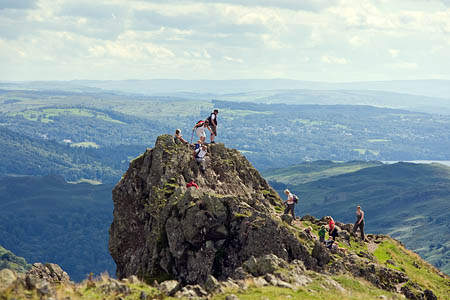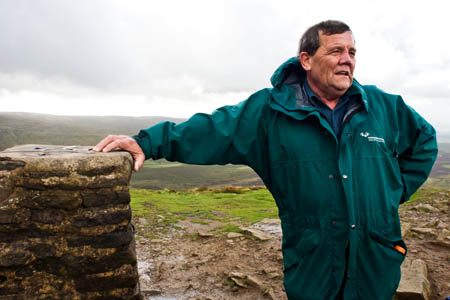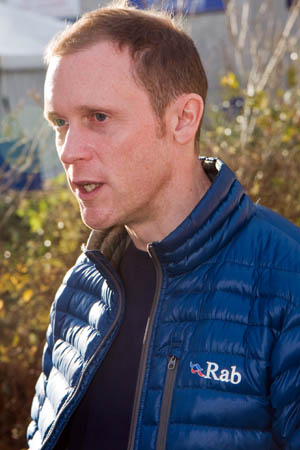England’s national park bosses were left reeling today after being told they face budget cuts of more than 28 per cent over the next four years.
The Department for the Environment, Food and Rural Affairs told national park authorities they will receive 21.5 per cent less cash over the next four years which, when inflation is taken into account, represents a 28.5 per cent cut.
The cuts are part of wide-ranging coalition Government public-sector reductions which it says are necessary to tackle the UK’s fiscal deficit.
But the charity the Campaign for National Parks reacted with dismay at the news. It also pointed out the figures provided for the three years from 2012 to 2014 are only indicative and will not be confirmed for some time.
Ruth Chambers, CNP’s head of policy, said: “21.5 per cent may not sound so bad in the context set by the Government’s plans to make overwhelming funding cuts across the board. But when inflation and the impact of secondary funding cuts are taken into account, today’s announcement will have a long-lasting and detrimental effect on the excellent work that these bodies do to look after national parks for the nation.
“The funding uncertainty for 2012 to 2014 will present budget planning challenges for the authorities but it is also an opportunity to explore ways to minimise the impacts of funding cuts in future years and to discuss other possible funding sources.
“Surely the parks, which are Britain’s breathing places and vital to our national wellbeing, deserve funding from across Government, not just Defra?”
And the CNP’s chief executive Helen Jackson pointed out the effects of the cuts on rural economies.
“National park authorities are important rural employers and without a doubt funding cuts on this scale will lead to job losses and a reduction in services,” she said.
“They play a vital role in supporting local communities and this work, alongside their conservation responsibilities, means that they are powerful advocates for sustainable development.
“We are worried that some of the difficult choices that park authorities will now be faced with to make ends meet will affect their role in championing sustainability and result in less activity on key work such as education, outreach and raising public awareness about key environmental challenges such as climate change.”
The Yorkshire Dales National Park Authority’s chair and a Conservative member of Craven Council Carl Lis said today’s announcement was bad news.
“It is impossible to pretend this is anything other than bad news and it clearly represents a major challenge over the four years,” he said.
“However, we are where we are so there is no point bleating about it. We have a responsibility to the national park, its communities and the country, so we will face up to the difficulties of putting together a budget that takes into account these cuts.”
The YDNPA’s annual grant for 2011 to 12 will be £5.1m, falling to £4.2m by 2014-15.
This compares to a grant of £5.4m for the current financial year and represents a cut of 28.5 per cent, taking into account inflation, over the four-year period, mirroring the cuts in other authorities.
David Butterworth, the Yorkshire Dales chief executive, said: “There is little point in beating about the bush. The size of the cut will obviously mean a reduction in services and a reduction in the number of staff employed by the authority; both immediately and over the four-year period, although the exact numbers are not yet confirmed.
“We will now be producing our detailed budget and working out exactly how we are going to cope in each financial year and what it will mean in terms of levels of services we can provide to the public.
“We intend to consult the public on the draft budget following a special authority meeting in February.”
However, speaking before the announcement of today’s cuts, the Lake District national park’s chief executive was more upbeat.
Richard Leafe told grough: “I think the important thing to say is that we’re not going to stop doing any of the services that we currently deliver. So we’re going to carry on all our access, our recreation, our countryside services roles, our rangering roles and we’re going to carry on delivering information services to visitors.
“So you shouldn’t see any change in the way in which the national park runs.”
However, Mr Leafe was assuming a cut of only 25 per cent rather than the full amount demanded by Defra today.
“We’re anticipating a reduction in the region of 25 per cent over four years,” he had said. “Defra’s reduction over that period is 29 per cent and our fingers are crossed that we’ll be a little bit less than that – 25 per cent – so that’s what I have been planning for for some time.
“So we’ve decided the strategy we want to pursue to tackle that.”
Increased use of volunteers and hikes in car parking and other charges were on the agenda, he said.
The Peak District authority chair Narendra Bajaria said: “We stand fast by the priorities set for us by the Government to protect wildlife and the landscape and promote understanding. We are the only organisation that will put them first and that is what we were set up by law to do. But we have to adjust our ways of working to manage savings of 29 per cent over four years.
“These are challenging times, and it is inevitable that some services will have to be scaled back, but we want the national park to continue as an exemplar for sustainable development and biodiversity and as a source of relaxation and well-being for people from all backgrounds.”
Chief executive Jim Dixon said: “All sections of the public sector are facing cuts to address the budget deficit and we have to play our part. A big aspect of this involves increasing our partnership work, sharing activities, pooling resources with other organisations and widening the work of our volunteers.
“We also want to develop a stronger commercial approach to our frontline services, increasing our income from leisure, information and recreation.
“Long before this we were examining our major assets to see if they could be managed more efficiently by others. We are in the process of leasing the Eastern Moors estate to a National Trust-RSPB partnership; we are entering negotiations with the Youth Hostel Association over the Losehill Hall environmental learning centre, and we are currently seeking partners for the Roaches Estate in Staffordshire.
“Our aim in all this is to change our ways of working to protect all that we do best, and to enable others to invest resources where we cannot. Our primary purpose is to safeguard the national park and its communities for the future.”
The authority’s decision to cease operating Losehill Hall means 22 full-time equivalent posts will be lost through redeployment, redundancy or early retirement. A reduced learning and discovery team of around 4½ full-time equivalent posts will continue to provide education services for schools, families and communities.
The ranger service will lose one full-time ranger post, out of 19, and payments to volunteer rangers will be brought in line with payments to other volunteers.
The authority will no longer have an in house design and photography service with the loss of three posts, and management and corporate support costs will be reduced largely by cutting the hours of five other posts.
Other bodies looking at funding cuts from Defra are Natural England, British Waterways, the Forestry Commission and the Environment Agency, which will see its flood management budget cut by eight per cent.



Mr E.Raine
30 December 2010“We also want to develop a stronger commercial approach to our frontline services, increasing our income from leisure, information and recreation......"
The above statement by the Chief Executive of the Peak District Authority fills me with a familiar sense of foreboding: I was born in Bakewell, and now live within 10 miles of the North York Moors' wild beauty. Please no hang-gliding franchises; no privately run tour routes; no concessions to commercial interests in 'geological exploration'; no increase in private fishing and shooting rights; no diminution of public access and 'roaming' rights; no big quid pro quo promotional deals with commercial concerns. The present cut-backs represent just another uncaring and reactionary attitude towards something that doesn't generate a profit - but, judged simply from a quality of life perspective, is far, far more important.